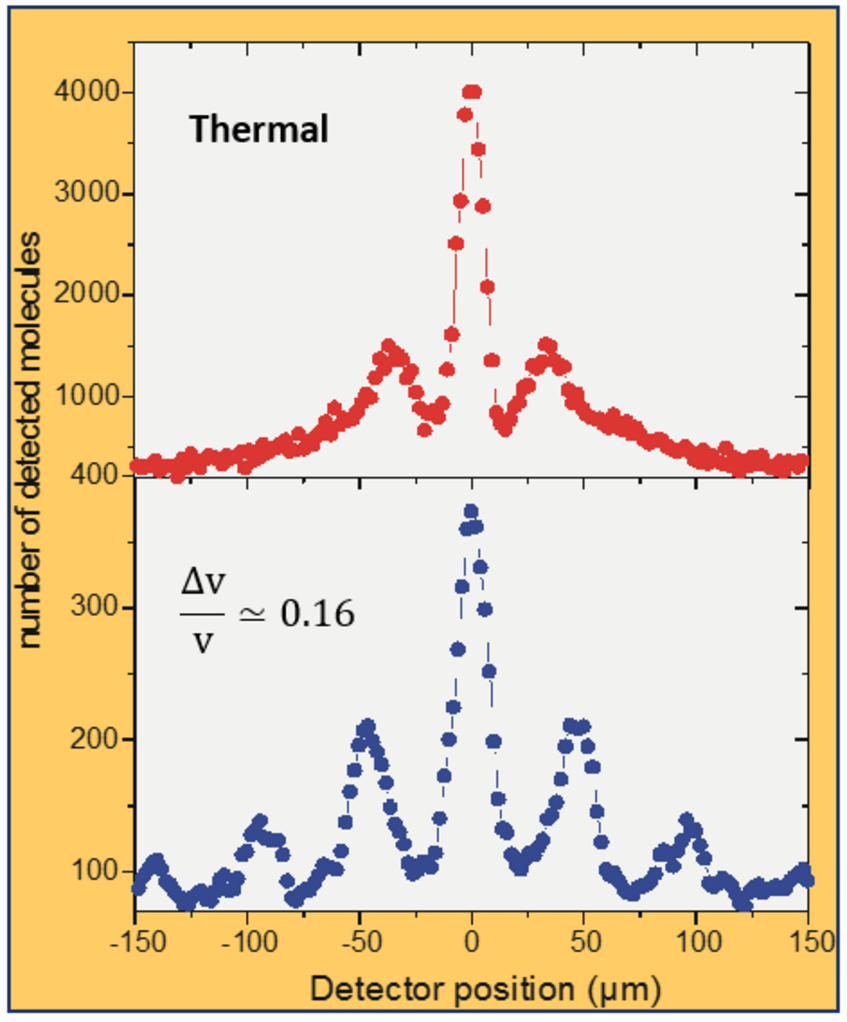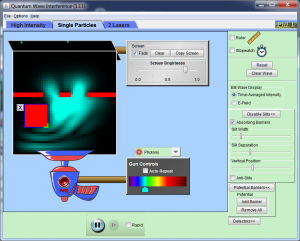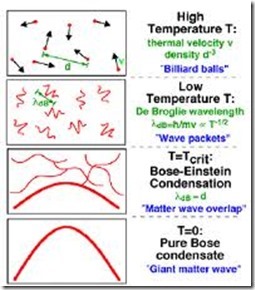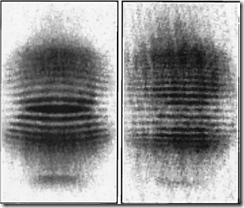The last post ended with phonons – quantized waves that have particle like behavior. So… how does this even remotely relate to matter?
As you probably know, matter also exhibits wave like properties, which was originally proposed by de Broglie. Based on that theory, matter has a frequency that is directly proportional to the total energy (which includes it’s mass). Schrödinger then published the famous wave equations of matter, which describe how those matter waves evolve over time (the equivalent of Maxwell’s equations). For instance, did you know that the Energy of a “particle” is also E= ![]() ? Just like in the case of photons and phonons?
? Just like in the case of photons and phonons?
It is not only possible to do the double slit experiment with electrons and neutrons, but even with atoms (such as He) and complex molecules even as large as C60 molecules (soccer ball shaped carbon cages):
Again you get the familiar interference pattern – even with such large molecules:

That means that even complex molecules as large as C60 behave as if they were in fact waves and not particles.
If you ask physicists (or check Wikipedia), they will give you one of several explanations for this wave like behavior of matter:
- the Many World interpretation: that basically each possibility actually happens for real in one of the infinite universes (and we live in just one of them).
- The Pilot Wave model, which proposes that there is a “guiding wave” that guide the actual real “particles”
- The Copenhagen interpretation, where the observer basically causes the wave function to collapse. The world is basically probabilistic, and the wave function does not describe a real wave, just a probability (and there is no real world out there if you don’t look)
- Wikipedia does mention that there is one scientist (Carver Mead) who thinks matter are real waves
So do we really need “parallel universes” and similarly weird explanations? Is there any more evidence?
Atom Lasers, Atom Interferometry and Atom Optics
There is an entire branch in physics called atom optics, which includes atom lasers, which are coherent beams of matter waves. Even here of course you could say well, these are not “real” waves, but just “probability density functions” as in the case for photons.
Such coherent matter waves are made using Bose Einstein Condensates. Wolfgang Ketterle won the Nobel prize for his work in this area – here is a link to his Nobel lecture on “When Atoms Behave as Waves”.
Basically as certain atoms (such as He4) are cooled down, the matter waves of the individual atoms start to overlap, until they form one gigantic matter wave. The wave is so large, that is is around 1mm in size (!). Not micrometer, millimeter. The distance between the fringes is about 15μm, that’s huge! In fact, it is even possible to take a picture of such a matter wave! Here, in the picture below, we see two such matter waves interfering with each other. Notice the light and dark lines? These is the same kind of interference pattern we are used to seeing with other interacting waves.
This is quite dramatic. Basically this means that atom + atom can = vacuum in some places. Parts of the matter waves cancel each other out!
Here is an excerpt from: http://cua.mit.edu/ketterle_group/Projects_1997/Interference/Interference_BEC.htm
Perhaps the most striking feature of quantum mechanical theory is the fact that it predicts that matter can behave like waves. This means that coherent matter waves can form interference patterns, just like the ones you would get if you combined two laser beams in an interferometer. The demonstration of interfering pathways in a neutron interferometer was perhaps the strongest affirmation of quantum theory and the wavelike nature of matter. Atom interferometer experiments followed which extended this demonstration to the size of an entire atom. But these experiments were limited to showing that a single particle could interfere with itself. Now, Bose-Einstein condensation has allowed us to make another advance, making it possible to interfere two completely independent clouds of atoms with each other.
In a recent experiment (2012), scientists say they have shown that matter waves are indeed real physical entities, where they conclude:
“In conclusion, we have presented a no-go theorem, which shows that models in which the quantum state is interpreted as mere information about an objective physical state of a system cannot
reproduce the predictions of quantum theory.“
Here there are several online simulations that let you play with waves (including the double slit experiment): Simulation of Quantum Wave Interference:

Getting back to the “Crystal Universe” idea by Hagen Kleinert – and much more detailed work based on this idea by Robert Close in “Classical Wave Theory of Matter”: in these models, we are in fact dealing with true waves, where the Dirac equation is interpreted as a “classical second-order wave equation for rotational waves in an elastic medium” (page 126) of space (or crystal, if you prefer that picture). Maybe now, given the images and experiments on BEC above, the idea that matter could indeed be true waves does not seem so totally strange anymore?
Did you know that Schrödinger had originally proposed that waves are real waves (until Max Born later introduced the interpretation of the probability density)? In fact, this is what Schrödinger had to say about the probability interpretation later on:
What we observe as material bodies and forces are nothing but shapes and variations in the structure of space…..Let me say at the outset, that in this discourse, I am opposing not a few special statements of quantum physics held today (1950s), I am opposing as it were the whole of it, I am opposing its basic views that have been shaped 25 years ago, when Max Born put forward his probability interpretation, which was accepted by almost everybody. I don’t like it, and I’m sorry I ever had anything to do with it. (Erwin Schrödinger , The Interpretation of Quantum Physics.)
Why is this idea not discussed more? After all, this model is equivalent to the “space time” model. One reason is that at the time when people did consider similar models (mostly related to an “aether”), they didn’t know yet that matter also exhibits wave properties. So at that time, even though they considered that light could be waves hat moves through a medium, they still treated matter as particles – which created problems. The question was, how do those particles move “through” such an “aether”. Now we know that the question is in fact misleading! In the crystal universe model, matter does not “move” through that (solid) space. It is only the vibrations that appear to “move”, just like heat or phonons appear to “move” through a crystal (when it is just the vibrations that change location, or just as sound waves appear to move (even thought the air itself is mostly stationary – if there is no wind).
Another reason for not discussing the idea more is probably the resistance to the idea that there could be a preferred frame – for some reason, many physicists really seem to hate that idea, even though (as you will see), this does not contradict special relativity in any way. We will discuss this more in the next post, when we talk about special relativity, and how SR looks like in the “crystal universe” model.
Next puzzle: Puzzle Piece 3: What’s special about Special Relativity?
Summary Table
Space-density Universe
|
Space-Time Universe
|
|
| Tags | elastic solid, crystal universe, optical-mechanical analogue, space exists | Minkowski, space-time, absolute space does not exist |
| GR Metric Tensor | space-density (space with compression) | space-time |
| Cause of Gravity | refraction (density gradient, optical) | curvature of space-time |
| Photon | quantized wave, similar to phonon quasiparticles in crystal (vibrational mode), there are no photon “particles” | probability density wave function, no “real” wave, probability of finding photon |
| Double Slit Experiment | real waves interfering (like phonons) | parallel universes, no real wave, “consciousness” ,probabilistic… |
| Schrödinger Wave Equation | describes real waves, rotational waves in an elastic solid. There are no particles | probability of finding a particle, there are no real waves |
| What is space? | An elastic solid (not made of matter). Matter and light moves though space as waves move through a crystal | There is no absolute space |
Links
Matter waves
- Foundations of the Quaternion Quantum Mechanics
www.mdpi.com/1099-4300/22/12/1424
Here is my version of this talk on youtube: https://youtu.be/UT_EFqmSisQ?t=1 - http://en.wikipedia.org/wiki/Matter_wave^
- Quantum Interference Experiments with Large Molecules:
http://130.58.92.210/Students/phys%205_2010/zeilinger%20ajp%202003.pdf - Double slit with single electrons: http://physicsworld.com/cws/article/news/2013/mar/14/feynmans-double-slit-experiment-gets-a-makeover
- Wave-particle duality of C60 molecules: http://www.nature.com/nature/journal/v401/n6754/abs/401680a0.html
- Diffraction fo C60 at a SiN grating: http://www.univie.ac.at/qfp/research/matterwave/c60/
-
W. Ketterle: When Atoms Behave as Waves: http://www.nobelprize.org/nobel_prizes/physics/laureates/2001/ketterle-lecture.pdf
-
Interference of two BEC: http://cua.mit.edu/ketterle_group/Projects_1997/Interference/Interference_BEC.htm
-
Properties of a Bose Einstein Condensate: http://www.uni-muenster.de/Physik.AP/Demokritov/en/Forschen/Forschungsschwerpunkte/mBECwatpoabec.html
-
Bose Einstein Condensation: http://www.theory.caltech.edu/~preskill/ph12c/ketterle-physicsworld.pdf
-
Exact Description of Rotational waves in an Elastic Solid (by Robert Close): http://www.classicalmatter.org/RotationWaves.pdf
-
Torsion Wave in Three Dimensions: Quantum Mechanics with a Twist (by Robert Close): http://www.ingentaconnect.com/content/klu/fopl/2002/00000015/00000001/00371047
-
Classical Wave Theory of Matter (by Robert Close): http://www.verumversa.com/ClassicalWaveTheoryOfMatter.pdf
-
Quantum Theorem Shakes Foundations (The wave function is a real physical object after all, say researchers):
http://www.nature.com/news/quantum-theorem-shakes-foundations-1.9392 -
On the Reality of the Quantum State: http://xxx.lanl.gov/abs/1111.3328
-
No Evidence for Particles: http://arxiv.org/ftp/arxiv/papers/0807/0807.3930.pdf
-
Recent Advances in Submolecular Resolution with Scanning Probe Microscopy: http://www.nature.com/nchem/journal/v3/n4/full/nchem.1008.html


![Interference-pattern-of-two-expandin[1] Interference-pattern-of-two-expandin[1]](http://www.askingwhy.org/blog/wp-content/uploads/2014/03/Interference-pattern-of-two-expandin1_thumb.jpg)